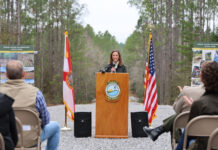“With this legislation we are addressing the challenges facing Florida’s property insurance market in a comprehensive way, balancing fair costs and protections for consumers while adding reasonable guardrails for insurance companies to help address frivolous litigation and fraudulent claims that drive up rates for everyone,” said Senator Boyd. “One of the most important parts of this legislation is the update to roofing policies, which ensures there is a clear understanding between homeowners and insurance companies about roof repair and replacement coverage and costs. We are protecting homeowners from being canceled when a roof is less than 15 years old, or when an inspection shows an older roof still has plenty of useable life left, and updating the building code to protect against unnecessary and costly roof replacements that, when part of an insurance claim, impact everyone’s premiums.”
“Across the state, Floridians are feeling the burden of skyrocketing property insurance premiums. To provide relief as quickly as possible, this legislation enhances insurer access to reinsurance, and insurers who participate in the program in 2022 are required to pass the savings onto consumers in a rate filing by June 30,” said Senate President Wilton Simpson (R-Trilby). “Additionally, the bill provides 2-to-1 matching grants that will help homeowners harden their homes against storm damage. These updates not only make homes safer for the families who live there, but because they reduce claims, insurance companies provide significant premium discounts for properties with these enhancements.”
Clarifying Options For Roof Repair And Replacement
The legislation allows property insurers to offer homeowner’s policies that include a roof deductible with an actuarially sound premium or credit. Policyholders will have the option to choose the insurance policy that best suits their needs. The bill also includes specific consumer protections that prohibit insurers from refusing to write policies on homes with roofs less than 15 years old.
Provides Homeowners the Option of Roof Deductible Policies
SB 2D allows residential property insurers to require a separate roof deductible that may not exceed the lesser of 2% of the policy dwelling limits or 50% of the roof replacement costs. Policyholders who select a roof deductible must receive a premium credit or discount.
The roof deductible does not apply to: a total loss to the primary structure that is caused by a covered peril; a loss caused by a hurricane; a roof loss resulting from a tree fall or other hazard that damages the roof and punctures the roof deck; or, a roof loss requiring repair of less than 50% of the roof.
Creating More Consumer Choice on Roof Repairs
SB 4D creates a statutory exception to the Florida Building Code so roofs that are more than 25% damaged, but already comply with the 2007 Florida Building Code or a subsequent code, may be repaired instead of being required to be replaced.
Improving Accessibility & Protecting Policyholders From Nonrenewal
Under SB 2D insurers may not refuse to write or renew policies on homes with roofs that are less than 15 years old solely because of the roof age, or for roofs that are at are over 15 years old if an inspection shows that the roof has five years or more of useful life left.
Matching Grants For Home Hardening That Keeps Homes Safe, Reducing Insurance Claims
SB 2D expands the My Safe Florida Home Program to include hurricane mitigation inspections and matching grants for retrofitting of homesteaded single family homes with a value of $500,000 or less, with the goal of making these upgrades financially attainable for more homeowners across Florida. Grants will be awarded on a matching basis with the program providing $2 in grant funds for every $1 provided by the homeowner. Applicants may receive up to $10,000 in program funds.
Enhancing Insurer Access To Reinsurance With Savings Passed On To Consumers
The bill authorizes $2 billion for a new Reinsurance to Assist Policyholders (RAP) program for insurers. This new program allows insurers to obtain reimbursement for hurricane losses below the insurer’s Florida Hurricane Catastrophe Fund retention. Insurers that participate in RAP for 2022 must reduce their policyholder’s rates in a rate filing by June 30, 2022, to reflect the savings from RAP. Insurers that defer using RAP until 2023 must reduce policyholder rates to reflect savings in a rate filing by May 1, 2023.
Increasing Insurer Transparency
SB 2D requires insurers to notify policyholders that they can request a copy of any detailed estimate of the amount of the loss determined by the adjuster. After receiving the request, the insurer must send the detailed estimate to the policyholder within seven days. Further, the bill requires insurers to provide a reasonable explanation in writing of the basis for the payment, denial, or partial denial of a claim. If the claim payment is less than specified in any insurer’s detailed estimate of the amount of the loss, the insurer must provide a reasonable explanation in writing of the difference.
The bill also directs the Office of Insurance Regulation (OIR) to make publicly available data detailing the number of policies, amount of premium, number of cancellations, and other data for each property insurer and specifies that this information is not a trade secret.
Holding Insurers Accountable
Several Florida property insurers have failed in the last year alone, resulting in tens of thousands of canceled policies. Timely analysis and reporting are key to understanding how to prevent future failures. SB 2D requires an analysis of why an insurer failed within four months of the Department of Financial Services being appointed as a receiver in liquidation proceedings.
Additionally, the bill strengthens the OIR’s regulatory oversight. SB 2D creates a new property insurer investigations unit to increase regulatory oversight and requires OIR to provide enhanced monitoring whenever the office identifies significant concerns about an insurer’s solvency, rates, proposed contracts, underwriting rules, market practices, claims handling, consumer complaints, litigation practices and outcomes, and other issues related to compliance with the insurance code.
Reducing Frivolous Litigation
SB 2D codifies that attorney fee multipliers only be awarded in rare and exceptional circumstances, clarifies when a bad faith suit may arise, and prohibits the ability to transfer the right to receive attorney fees in property insurance litigation.
To curb unscrupulous roof claims, the bill enhances reforms passed in in SB 76 (2021), prohibiting written contractors’ solicitations that encourage consumers to make a property insurance claim for roof damage unless the solicitation provides certain notices.
Improves Condo Safety Requirements
SB 4 requires condominium and cooperative association buildings that are three or more stories high to have a structural integrity inspection by an architect or engineer when a building reaches 30 years of age and every 10 years thereafter, or 25 years of age and every 10 years thereafter if the building is located within three miles of a coastline. The inspection report results must be provided to local building officials, associations, and unit owners.
Among other requirements, the bill requires condominium and cooperative associations to conduct a “structural integrity reserve study” every 10 years for each building that is three stories or higher. The study must include the roof, load bearing walls, floor, foundation, fireproofing and fire protection systems, plumbing, and any item with a deferred maintenance or replacement cost that exceeds $10,000. Effective July 1, 2024, condominium and cooperative associations are prohibited from using reserves outside of their purposes, waiving the reserves, or reducing the funding of reserves for certain structural components of the property.
Media Release: Florida Senate, Office of the President Wilton Simpson. May 24, 2022















































